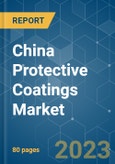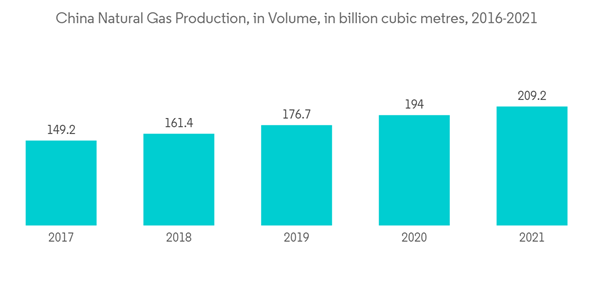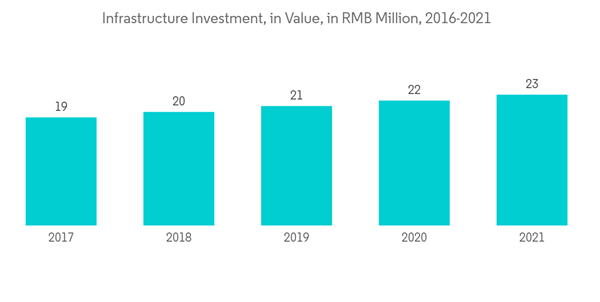COVID-19 negatively impacted the market in 2020. However, the market has now been estimated to have reached pre-pandemic levels and is forecasted to grow steadily.
Key Highlights
- The driving factors that lead to market growth include initiatives and policies from the government to develop infrastructure and increase activities in the oil and gas sector. Increasing revenue generation from various industries such as plastics, pulp, and paper, among others, and a rising shift in focus towards sustainable coatings are the key market trends driving the market.
- With supply chain disruptions post-COVID-19 pandemic, raw material prices' fluctuation has hindered the protective coatings market.
- The growing options for bio-based coatings are further likely to provide opportunities for the studied market during the forecast period.
China Protective Coatings Market Trends
Increasing Activity in the Oil and Gas Sector
- The oil and gas industry is one of the key contributors to the Chinese economy. The oil and gas industry operates in high-temperature environments. Thus the sector necessitates heat-resistant coatings. Coatings are also used to protect metal and steel structures from corrosion when exposed to moist and damp conditions. In the oil and gas industry, they are used for tanks, pipes, valves, and pumps, among others.
- To prevent corrosion during oil and gas transportation to refineries, the oil and gas industry uses protective coatings for both upstream and downstream segments. The industry has been looking for ways to reduce capital costs. The need to comply with stringent environmental regulations has resulted in bio-based coatings demand in the region which is expected to have positive growth in the forecast period.
- Offshore oil and gas production faces some of the most difficult challenges. As a result, the coating systems used must withstand these conditions. Long-term exposure to penetrating UV rays and constant contact with heat waves in the oil and gas sector increases the demand for protective coatings.
- According to BP Statistical Review 2022, the overall oil consumption in the country has been on the rise over the decade. For instance, in 2021, the country's oil consumption in thousands of barrels per day was 15,442 thousand barrels per day, whereas in 2020, the consumption stood at 14,408 thousand barrels per day. In addition, the consumption growth rate is 4.8% yearly over the decade between 2011-21.
- Moreover, the same source cited that the country witnessed positive growth in natural gas production. For instance, in 2020, the natural gas produced was 194 billion cubic meters whereas, in 2021, the production increased to 209.2 billion cubic meters, around 8.1% growth. In addition, over the decade, production has been growing by an average of 7% yearly.
- All the above factors are expected to augment the demand for protective coatings for the oil and gas industry during the forecast period.
The Rise in Demand from the Infrastructure Sector
- The infrastructure sector is one of the major end users of protective coatings. The industry requires corrosion and environmental effects-resistant coatings due to exposure of infrastructure surfaces to heat & sunlight, water, and acid rain, dust, and other chemical effects.
- The infrastructure sector uses protective coatings for bridges and coastal Structures including roads and rail structures, Water Treatment, public power generation and transmission, and other infrastructure including public buildings. Moreover, organizations in China are shifting focus toward strict environmental regulations, which has led to an increased demand for sustainable coating systems.
- One of China's main economic growth drivers has been its infrastructure investment. The government has planned funding to be directed primarily toward long-term infrastructure projects such as water infrastructures, and transportation among others that are likely to play a positive role in the economic growth of the country in the forecast period.
- In 2021, China allocated a quota of USD 573 billion in Special Purpose Bonds for the purpose of developing major infrastructure projects to local governments. Moreover, in January 2022, local governments issued a total of USD 109.9 billion of bonds of which USD 70.5 billion were new Special Purpose Bonds (SPBs). This is a 93% increase from the same period in 2021.
- Furthermore, in August 2022, Beijing authorities in China has further planned an investment of USD 146 billion for boosting economy and revenue generation in the country. The five major projects covered include renewables, canals, dams and reservoirs, urban infrastructure, rail infrastructure and major data centers.
- All the above-motioned factors are expected to augment the demand for protective coatings for the infrastructure sector during the forecast period.
China Protective Coatings Market Competitor Analysis
The China protective coatings market is fragmented in nature. Some of the major players in the market (not in any particular order) include RPM International Inc, AkzoNobel NV, Jotun, the Sherwin-Williams Company, and PPG Industries, among others.Additional benefits of purchasing the report:
- The market estimate (ME) sheet in Excel format
- 3 months of analyst support
This product will be delivered within 2 business days.
Table of Contents
1 INTRODUCTION1.1 Study Assumptions
1.2 Scope of the Study
2 RESEARCH METHODOLOGY
3 EXECUTIVE SUMMARY
4 MARKET DYNAMICS
4.1 Market Overview
4.2 Market Drivers
4.2.1 Increasing Activity in the Oil and Gas Sector.
4.2.2 The Rise in Demand from the Infrastructure sector
4.3 Market Restraints
4.3.1 Price Hikes of Raw Materials
4.3.2 Other Restraints
4.4 Industry Value Chain Analysis
4.5 Porter's Five Forces Analysis
4.5.1 Threat of New Entrants
4.5.2 Bargaining Power of Buyers/Consumers
4.5.3 Bargaining Power of Suppliers
4.5.4 Threat of Substitute Products
4.5.5 Intensity of Competitive Rivalry
5 MARKET SEGMENTATION (Market Size in Value)
5.1 Resin Type
5.1.1 Epoxy
5.1.2 Acrylic
5.1.3 Alkyd
5.1.4 Polyurethane
5.1.5 Polyester
5.1.6 Other Resin Type
5.2 Technology
5.2.1 Water Borne Coatings
5.2.2 Solvent Borne Coatings
5.2.3 Powder Coatings
5.2.4 UV Cured Coatings
5.3 End User Industry
5.3.1 Oil and Gas
5.3.2 Mining
5.3.3 Power
5.3.4 Infrastructure
5.3.5 Other End User Industry
6 COMPETITIVE LANDSCAPE
6.1 Mergers and Acquisitions, Joint Ventures, Collaborations, and Agreements
6.2 Market Share (%) **/Ranking Analysis
6.3 Strategies Adopted by Leading Players
6.4 Company Profiles
6.4.1 AkzoNobel N.V.
6.4.2 Axalta Coating Systems
6.4.3 Beckers Group
6.4.4 FUXI
6.4.5 Helios Coatings
6.4.6 Hempel A/S
6.4.7 Jotun
6.4.8 Nippon Paint China
6.4.9 Noroo Paint
6.4.10 PPG Industries Inc.
6.4.11 RPM International Inc
6.4.12 Sino Polymer
6.4.13 The Sherwin Williams Company
7 MARKET OPPORTUNITIES AND FUTURE TRENDS
7.1 Bio-Based Coatings for Sustainable Solutions
Companies Mentioned (Partial List)
A selection of companies mentioned in this report includes, but is not limited to:
- AkzoNobel N.V.
- Axalta Coating Systems
- Beckers Group
- FUXI
- Helios Coatings
- Hempel A/S
- Jotun
- Nippon Paint China
- Noroo Paint
- PPG Industries Inc.
- RPM International Inc
- Sino Polymer
- The Sherwin Williams Company










